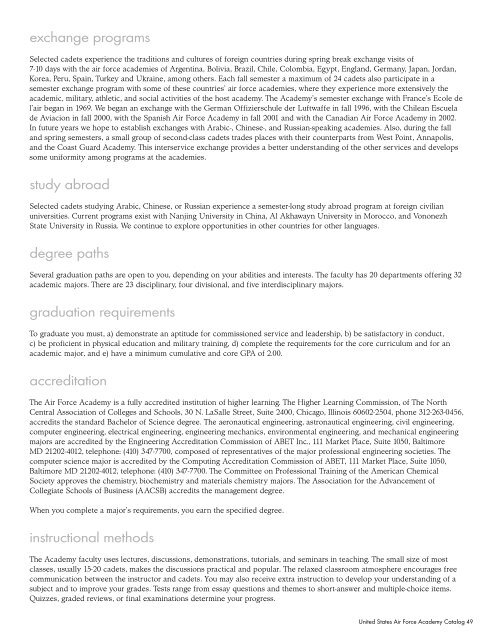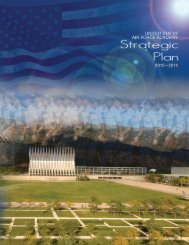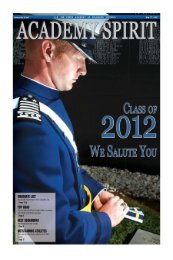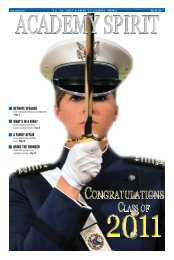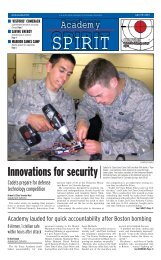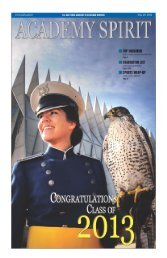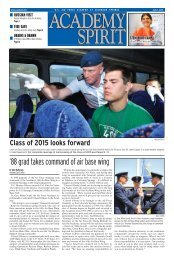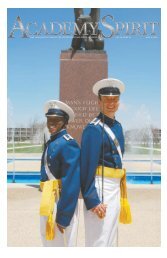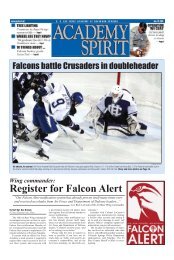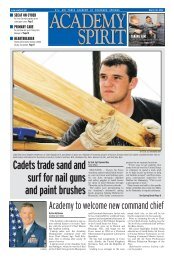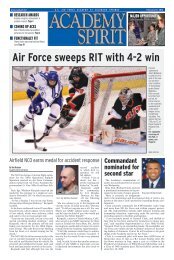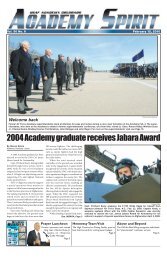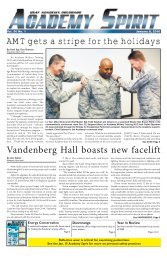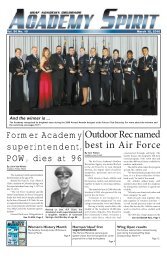2008-2009 Catalog - United States Air Force Academy
2008-2009 Catalog - United States Air Force Academy
2008-2009 Catalog - United States Air Force Academy
Create successful ePaper yourself
Turn your PDF publications into a flip-book with our unique Google optimized e-Paper software.
exchange programs<br />
Selected cadets experience the traditions and cultures of foreign countries during spring break exchange visits of<br />
7-10 days with the air force academies of Argentina, Bolivia, Brazil, Chile, Colombia, Egypt, England, Germany, Japan, Jordan,<br />
Korea, Peru, Spain, Turkey and Ukraine, among others. Each fall semester a maximum of 24 cadets also participate in a<br />
semester exchange program with some of these countries’ air force academies, where they experience more extensively the<br />
academic, military, athletic, and social activities of the host academy. The <strong>Academy</strong>’s semester exchange with France’s Ecole de<br />
l’air began in 1969. We began an exchange with the German Offizierschule der Luftwaffe in fall 1996, with the Chilean Escuela<br />
de Aviacion in fall 2000, with the Spanish <strong>Air</strong> <strong>Force</strong> <strong>Academy</strong> in fall 2001 and with the Canadian <strong>Air</strong> <strong>Force</strong> <strong>Academy</strong> in 2002.<br />
In future years we hope to establish exchanges with Arabic-, Chinese-, and Russian-speaking academies. Also, during the fall<br />
and spring semesters, a small group of second-class cadets trades places with their counterparts from West Point, Annapolis,<br />
and the Coast Guard <strong>Academy</strong>. This interservice exchange provides a better understanding of the other services and develops<br />
some uniformity among programs at the academies.<br />
study abroad<br />
Selected cadets studying Arabic, Chinese, or Russian experience a semester-long study abroad program at foreign civilian<br />
universities. Current programs exist with Nanjing University in China, Al Akhawayn University in Morocco, and Vononezh<br />
State University in Russia. We continue to explore opportunities in other countries for other languages.<br />
degree paths<br />
Several graduation paths are open to you, depending on your abilities and interests. The faculty has 20 departments offering 32<br />
academic majors. There are 23 disciplinary, four divisional, and five interdisciplinary majors.<br />
graduation requirements<br />
To graduate you must, a) demonstrate an aptitude for commissioned service and leadership, b) be satisfactory in conduct,<br />
c) be proficient in physical education and military training, d) complete the requirements for the core curriculum and for an<br />
academic major, and e) have a minimum cumulative and core GPA of 2.00.<br />
accreditation<br />
The <strong>Air</strong> <strong>Force</strong> <strong>Academy</strong> is a fully accredited institution of higher learning. The Higher Learning Commission, of The North<br />
Central Association of Colleges and Schools, 30 N. LaSalle Street, Suite 2400, Chicago, Illinois 60602-2504, phone 312-263-0456,<br />
accredits the standard Bachelor of Science degree. The aeronautical engineering, astronautical engineering, civil engineering,<br />
computer engineering, electrical engineering, engineering mechanics, environmental engineering, and mechanical engineering<br />
majors are accredited by the Engineering Accreditation Commission of ABET Inc., 111 Market Place, Suite 1050, Baltimore<br />
MD 21202-4012, telephone: (410) 347-7700, composed of representatives of the major professional engineering societies. The<br />
computer science major is accredited by the Computing Accreditation Commission of ABET, 111 Market Place, Suite 1050,<br />
Baltimore MD 21202-4012, telephone: (410) 347-7700. The Committee on Professional Training of the American Chemical<br />
Society approves the chemistry, biochemistry and materials chemistry majors. The Association for the Advancement of<br />
Collegiate Schools of Business (AACSB) accredits the management degree.<br />
When you complete a major’s requirements, you earn the specified degree.<br />
instructional methods<br />
The <strong>Academy</strong> faculty uses lectures, discussions, demonstrations, tutorials, and seminars in teaching. The small size of most<br />
classes, usually 15-20 cadets, makes the discussions practical and popular. The relaxed classroom atmosphere encourages free<br />
communication between the instructor and cadets. You may also receive extra instruction to develop your understanding of a<br />
subject and to improve your grades. Tests range from essay questions and themes to short-answer and multiple-choice items.<br />
Quizzes, graded reviews, or final examinations determine your progress.<br />
<strong>United</strong> <strong>States</strong> <strong>Air</strong> <strong>Force</strong> <strong>Academy</strong> <strong>Catalog</strong> 49


